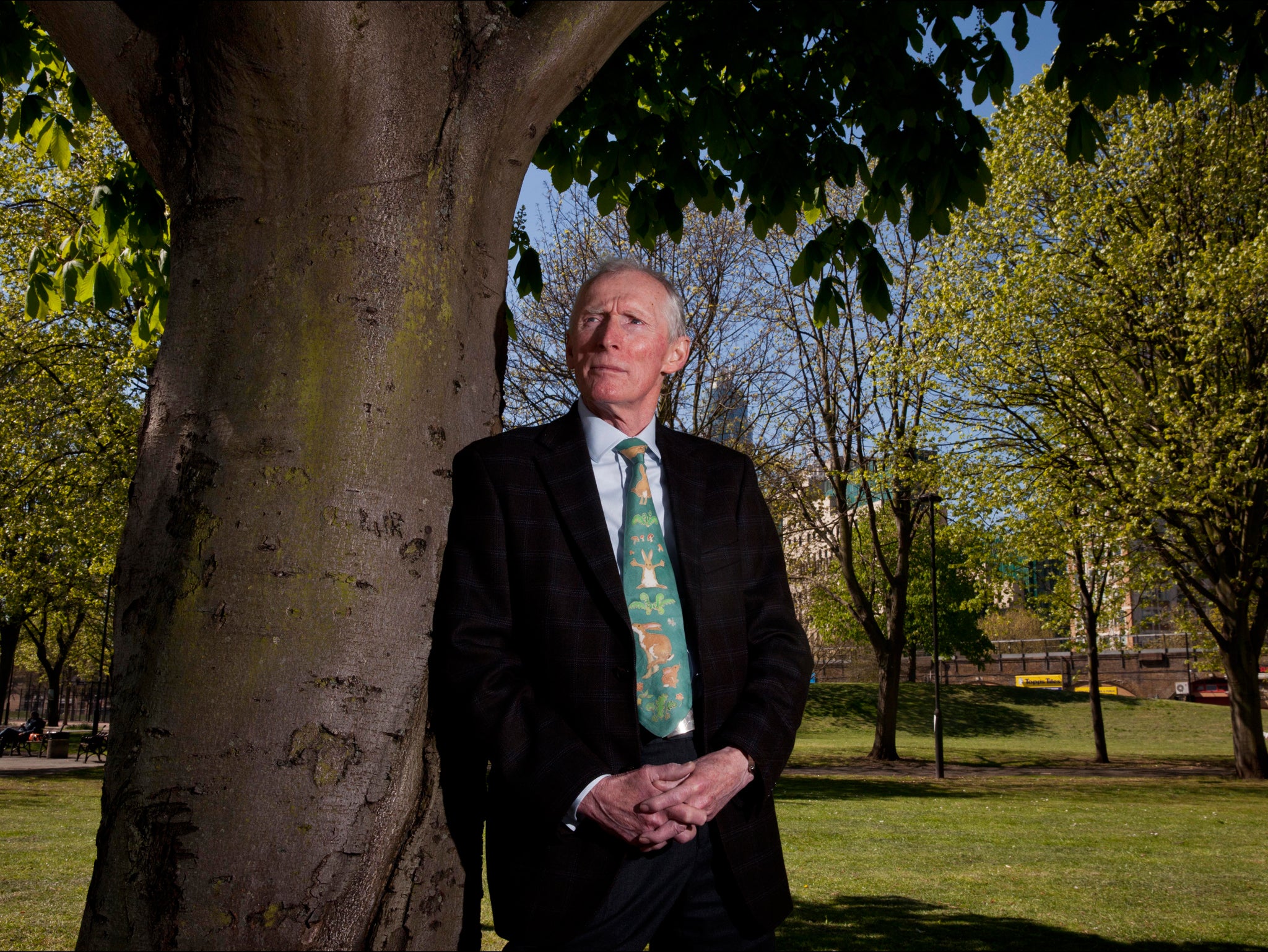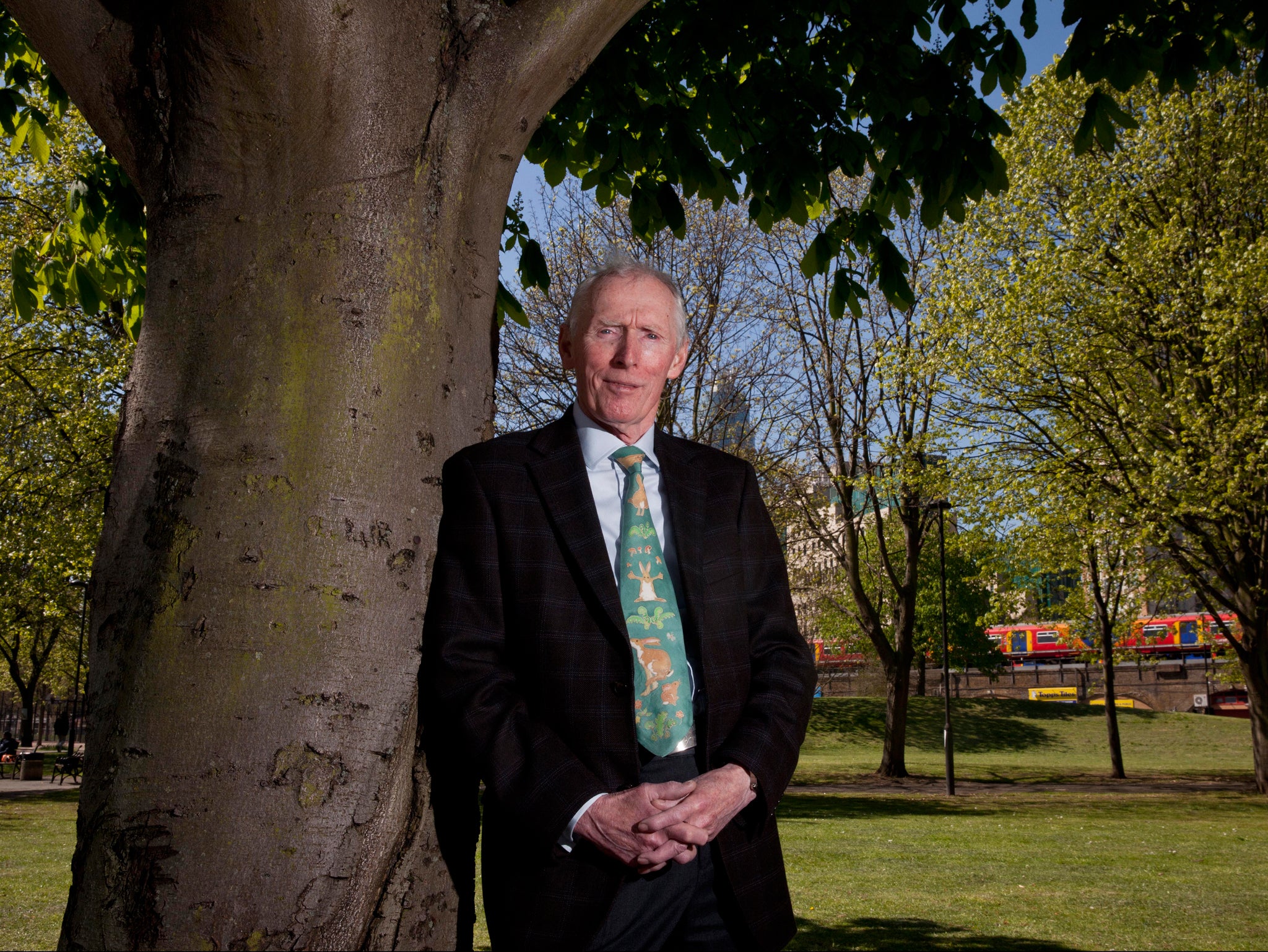Children's author Sam McBratney: 'You know the Narnia books? I’ve only come across one child who really appreciated those books'
'You don’t get child prodigies writing books, because there is so much to be learnt about the art of writing'

Your support helps us to tell the story
From reproductive rights to climate change to Big Tech, The Independent is on the ground when the story is developing. Whether it's investigating the financials of Elon Musk's pro-Trump PAC or producing our latest documentary, 'The A Word', which shines a light on the American women fighting for reproductive rights, we know how important it is to parse out the facts from the messaging.
At such a critical moment in US history, we need reporters on the ground. Your donation allows us to keep sending journalists to speak to both sides of the story.
The Independent is trusted by Americans across the entire political spectrum. And unlike many other quality news outlets, we choose not to lock Americans out of our reporting and analysis with paywalls. We believe quality journalism should be available to everyone, paid for by those who can afford it.
Your support makes all the difference.How far does someone love you? To the end of the earth? To the moon and back? Or perhaps you’re struggling, like the father in Boston, Massachusetts, who told Sam McBratney that on a “bad night, my little girl only loves me to the door”. For the past 20 years, millions of people have measured love in distance not quantity, inspired by the author’s global bestseller, Guess How Much I Love You.
The picture book describes how a baby hare and his dad compete to see which one loves the other more, with the father sneaking victory after his little one nods off after a long day. (“I love you right up to the moon – AND BACK!” Big Nutbrown Hare whispers to his sleeping son.) But it’s a game anyone can play, smiles the gentle McBratney, who even two decades on seems surprised at his story’s phenomenal popularity.
“People buy it for all sorts of reasons. It’s been read out in St Patrick’s Cathedral, New York, and at a Mormon Church, in Salt Lake City. It suits almost any relationship. People buy it for their grannies; grannies buy it for their grandchildren.” Weddings, funerals, and endless, endless bedtimes all resonate to McBratney’s soothing words, which I’ll forever hear in a soft brogue after meeting him. The book, which started out as a suggestion from his editor at Walker Books, has sold 30 million copies and counting, with the Chinese being the latest to fall under Big Nutbrown Hare’s spell.
“Writing a picture book was a bit of a challenge. I knew I wanted to write something that would capture a tender moment between a parent and a child, and something that the parent wouldn’t tire of reading again and again, and something the child wouldn’t tire of hearing again and again. To make it interesting for the big one and the wee one.”
McBratney, a 72-year-old father of three and grandfather of six, who has been coaxed to London from his home near Lisburn to mark the book’s 20th anniversary, thinks Little Nutbrown Hare could be this generation’s Peter Rabbit. “I have some ideas for developing hare stories that I find quite thrilling. I believe Hare World can be expanded and they could even get a little older,” he says. From tea sets to cuddly toys, the merchandise already exists; a television version airs in Australia, although McBratney didn’t write the stories. He is even sporting a Guess How Much I Love You tie, although it’s a one-off; the illustrator Anita Jeram painted the hare images on to the bottle-green silk tie as a gift 20 years ago.
Some seize on the book’s father-son relationship, given that dads can find it hard to express their love for their children, something McBratney, a former teacher, thinks only worsens as kids age. “It is hard, and the older a child gets, the harder it is. To this day, my wife will hug all the grandchildren when they arrive, but I don’t. I think it’s probably true to say that fathers are less demonstrative than mothers.” Yet I’ve read the book countless times and barely registered the hare’s gender, hence the universal appeal, I guess (no pun intended).
Despite writing one of the best-selling children’s books of all time – it sits just outside the top 10 according to Publishers’ Weekly – McBratney is a realist when it comes to the power of reading to children. “This connection [between] reading to children and making children into readers is one that I don’t buy. I think children are readers by temperament. There are children who want to curl up with a book and you won’t stop them, and there are children who won’t curl up with a book and you won’t make them. I think it comes down to who you are.”

And parents shouldn’t fuss. “I’d let them be. My children aren’t readers. I call them ‘Children of Margaret Thatcher’. One did business studies; one did computers; and one did physics at Imperial College. There’s not a reader among them. My daughter, she reads trivial stuff. The two boys, I’d say, they don’t read much at all.”
Growing up in 1940s Northern Ireland, McBratney says “nobody read to me” and nor were there even any children’s books in his house. “I spent more time reading books that my father left lying around, [by authors] like Zane Grey, or my mother’s magazines, like People’s Friend.” That said, he worries the wrong books, at the wrong time, can put children off reading.
“I could very easily rant about English literature in schools because I think children are given texts too early,” he says. “You want to hear my three kids talking about Great Expectations. You’d swear it was the worst novel ever written because they did it in second form. Dickens too soon. Shakespeare too soon. You might find it shocking, but you know the Narnia books? I’ve only come across one child who really appreciated those books. Introducing children to the classics isn’t going to make them read the classics when they’re grown up, any more than reading to children when they’re a baby is going to turn them into readers when they’re older.”
He swears he’s a writer “by temperament”, adding: “I write everything down; always have done. I didn’t keep a diary, but all through college I was always, always noticing things, rather like a sketch in words. I remember coming home on the bus one day, and the boy in front of me had a tremendous pair of ears. Big, thin, sticky-out ears. And the sun was coming through the front of the bus and the sun lit up his ears and they glowed. And I remember that I put those ears into the next story that I wrote. I’m cropping for corn all the time.”
He’s resigned never to writing another Guess, which took six months to perfect despite being only about 400 words – but not because he has already peaked. “This is another thing about writing. You don’t get child prodigies writing books, because there is so much to be learnt about the art of writing; there’s so much craftsmanship involved in the whole process.”
Writers, he thinks, keep improving. “Obviously there’s a cut-off point but they do [get better]. Even very good young novelists will get better. A lot of my later books were scrap material from things that hadn’t worked. The truth is that you have to keep at this. You will get better but it’s not easy. Don’t throw anything away.”
Join our commenting forum
Join thought-provoking conversations, follow other Independent readers and see their replies
Comments